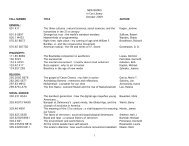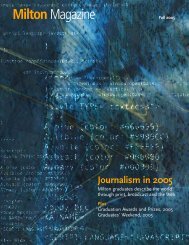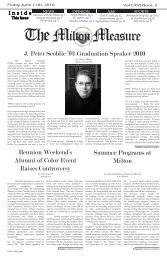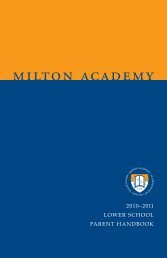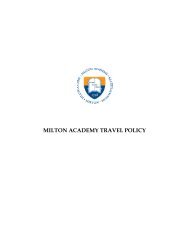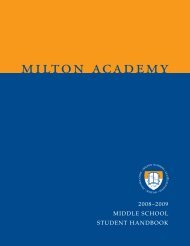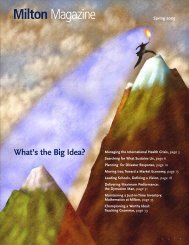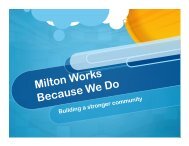Spring 2007 - Milton Academy
Spring 2007 - Milton Academy
Spring 2007 - Milton Academy
- No tags were found...
You also want an ePaper? Increase the reach of your titles
YUMPU automatically turns print PDFs into web optimized ePapers that Google loves.
Eric Schwarz ’79Co-founder and CEO of Boston-basededucational program, Citizen SchoolsCitizen Schools began in Dorchester,Massachusetts, in 1995 with a vision ofhelping to improve student achievementby blending real-world learning projectsand rigorous academics after school. Thename comes from the idea that citizenswithin the community—lawyers, chefs,reporters, architects—would donate theirtime to working with a group of studentsin an apprenticeship relationship, sharingtheir strengths and teaching children someof the skills necessary to succeed in thatparticular career.The teaching model of Citizen Schools,co-founded by Eric Schwarz ’79, took itscue from Howard Gardner of HarvardUniversity, who described the power ofapprenticeship learning in his book TheUnschooled Mind. Gardner—along withJohn Dewey, described by Eric as “thepatron saint of progressive education”—points to learning through doing as theroot of great education. Eric notes that“<strong>Milton</strong> classrooms do that very well, butmost students don’t get much exposure toit. At Citizen Schools we set students upwith the best architects, for instance, andthey have a model of success and someonewho wants to share his or her knowledge.The students have the chance to realizethat math and geometry are not onlyimportant because their teachers say theyare, but because they need those skills to,say, create the playground that they areactually planning and building.”What started small, with Eric and cofounderNed Rimer teaching journalismand firstaid, respectively, has developedinto a national organization reaching over3,000 middle-school-aged students in 15cities across five states and engaging 2,400volunteers. Outreach for volunteers beganwith Eric and Ned turning to their personalnetwork of friends and co-workers. As theprogram developed, larger companiesbecame involved as a way to support theiremployees. “There is a hunger in a lot ofpeople to connect with children,” Eric says,“and many have been involved with BigBrothers, Big Sisters or some other similarorganization. What we offer, though, is thechance for mentoring with a purpose andplaying to your strengths, and then passingthat on to kids who are so eager to learnfrom you.“The program gives students the chance toexperience the joy of work and the fun inlearning; it gives meaning to their academicsand gives them a real-world context forlearning. It provides them with aspirations,role models and a reason to work hard withan experience of success. The belief fromthe beginning has been focused on results,on tangible outcome gains.”Although apprenticeship is a major part ofthe program, with each student participatingin four apprenticeships each year,there is also a more traditional and comprehensivecurriculum that provideshomework help, study skills, tutoring, andfield trips to colleges and museums. AsEric explains, the organization attracts abroad group of students—those who arereally motivated, those who fall toward themiddle of the pack, and those who are twoto four grade levels behind where theyshould be. Ninety-one percent of participantsare low-income.“Low-income urban children have a 50percent chance of graduating from highschool,” Eric reports. “Yet alumni ofCitizen Schools have gone on to Smith,Wesleyan, Boston College, MIT. We havefour to five years’ worth of reliable datafrom a longitudinal study to supportthe success of our programs. The studycompared 1,000 middle-school studentsinvolved in Citizen Schools for at least afull year against a matched comparisongroup of similar students of the same age.Our students outperformed the comparisonstudents on six out of seven academicmetrics, including test scores, attendance,and promotion rates, and graduates weremore than two times as likely to go on to atop-tier college preparatory high school.”And what are the challenges of such aninnovative and comprehensive program?“Because this is a new paradigm, one ofthe first things we have to do is change theway people think of learning and education,”Eric says. “The common notion isthat [teaching and learning] are limited tothe school day and the classroom, yet thereis so much room, and desire, for learningoutside of the classroom. Students spendup to 80 percent of their waking hoursoutside of school. Another major and constantchallenge of any nonprofit organizationis raising funding and cultivatingpartnerships.”About 20 percent of Citizen Schools’ fundingcomes from government grants underthe federal No Child Left Behind Act. Theorganization also receives funding fromAmeriCorps and from individual and corporatedonors. As the program grows, itcontinues to build up connections withlarger corporations and supporters suchas Goldman Sachs, Fidelity, the EdnaMcConnell Clark Foundation and Bank ofAmerica. With plans to increase the numberof students served fourfold over thenext five years, the organization also hopesto increase funding from $11 million lastyear to $35 million by 2011–12.Citizen Schools has received several prestigiousawards since its inception, includingthe MassINC Commonwealth Medal, threeconsecutive four-star ratings from CharityNavigator and, most recently, its thirdSocial Capitalist Award from Fast CompanyMagazine, a partner of Monitor Group,which names organizations for donors“who want the highest possible socialreturn for their charitable gifts.” This winter,the organization was also profiled onthe front page of Education Week.www.citizenschools.orgEEHEric Schwarz ’79Ralph Alswang27 <strong>Milton</strong> Magazine



